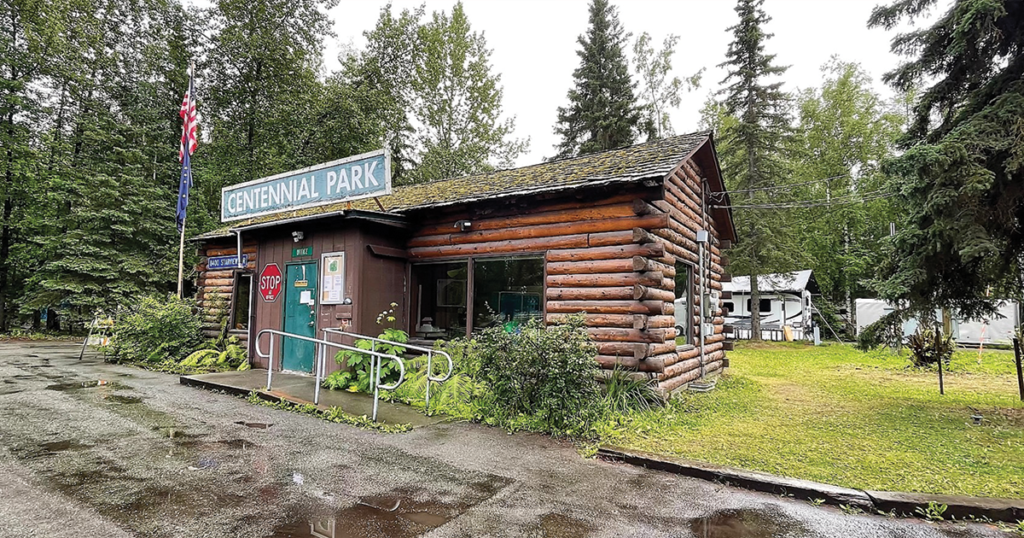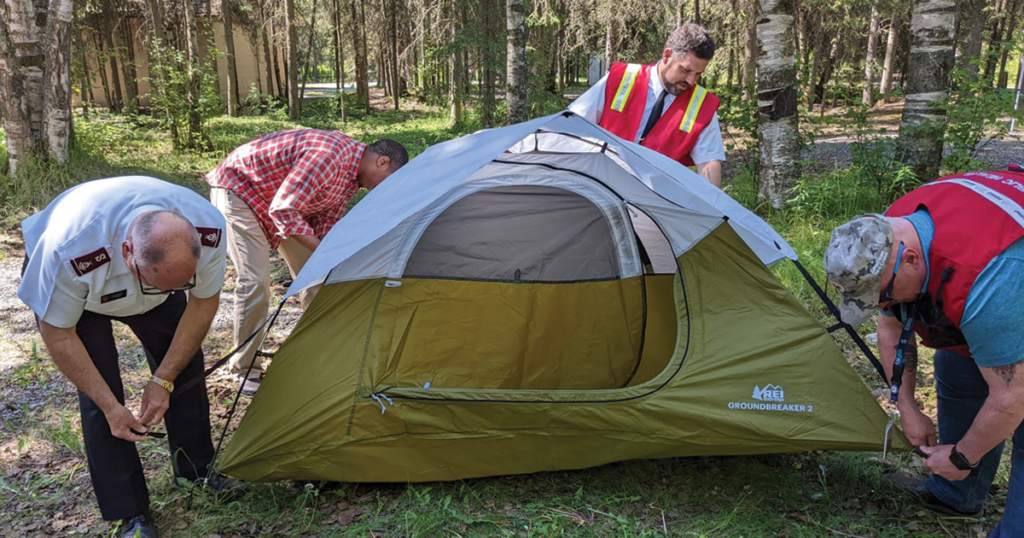Centennial Campground
Late last summer, The Salvation Army of Anchorage responded to a growing problem in their community.
The city of Anchorage had been providing shelter for homeless individuals at Sullivan Arena to slow the spread of COVID-19, but they lost funding for the shelter, which made it impossible to continue operation. The shelter was cleared out, and while some residents found a place to stay, there were 40 individuals with nowhere to turn. They ended up at the Centennial Campgrounds, provided with tents by the mayor’s office.
Captain Denice Delgado says that the Army was there on day one, helping these individuals set up their tents and providing them with things they might need. They tried to “nudge” people towards shelters and services that could set them on better paths, but Captain Delgado says they were content to camp and be left alone. Before long, the number of homeless people living on the campground grew to the hundreds.
Captain Delgado described the conditions at the campground as muddy, wet and cold. But more importantly, the temperature had not yet dropped below 45 degrees Fahrenheit. “That would enact a response from the municipality,” said Delgado. Once the weather turned and winter set in, the city would be required to provide indoor shelter for the homeless. Until then, both the homeless and the people looking out for them (like the Army) were more or less biding their time. All the while, the city of Anchorage characterized the situation as “open camping.”
“We took on the coordination of food, donations and client care,” said Delgado. “Partners are scared to come in because they’re saying that there’s no safety or checking to make sure people don’t have knives or guns or anything of that nature.”
Delgado says that the campsite was a more precarious situation earlier on, and many people and organizations were unwilling to help due to a shooting that had taken place. A patrolling police officer saw someone on the campgrounds that they suspected was involved in an armed robbery. When they approached to confirm their identity, the suspect opened fire. Both survived the encounter, but many were scared.
Despite the risk, there were a handful of groups that were willing to go the extra mile and help The Salvation Army provide care, all without any funding or contracts from the city. Bean’s Café, a local restaurant, provided three meals a day for all the residents of the campsite; the Bureau of Indian Affairs came to help Alaskan Natives get their ID cards; the Food Bank of Alaska assisted people with enrolling in the SNAP program.
Of the groups that have assisted the Army in efforts at the campground, Captain Delgado says that Bean’s Café was the strongest partner. She mentions that on top of their food donations, Bean’s Café also offered campsite residents their Streets to Success program, which focuses on finding people housing and employment.
Other groups that have helped include a downtown help center, the Brother Francis Shelter and the Gospel Rescue Mission. All groups either moved willing individuals into their shelters or provided critical services for the residents of the Centennial Campgrounds.
The response to these efforts has been a mixed bag. Some people (Captain Delgado estimates about 20 percent) reject the help, and as she said, want to be left alone. But there’s been some positivity as well. “I hear all the time that they love us. They know that we’re doing the best we can with what we have. We’re really trying to advocate for individuals,” she says.
Captain Delgado goes on to say that she’s never felt in danger with the residents of the camp. She only wanted to help people who were in a tough situation. “If you respect individuals, they’ll respect you. I really haven’t had an issue … It’s our mission as Christians to help those with less than us.”
She talks about the success stories that came out of the campground ministry, like an elderly man who got to take a bath for the first time in 10 years, or the multiple women with children who got into shelters, then housing, then found employment.

For Captain Delgado, helping those families was personal. “My parents were addicts,” she said. She knows what it’s like to have parents that struggle to care for their children, so keeping families housed and out of the campgrounds was a priority for her. “I don’t want kids there … If there is something better, we will make sure that they go there.”
The Salvation Army and the volunteers who assisted them proved through their efforts that they are committed to the Army’s mission of meeting needs without discrimination. Helping people at the Centennial Campgrounds was no easy task, and the lack of support from the city and a lot of community didn’t make it any easier.
“It can be downright hopeless,” said Captain Delgado. “You get to see the worst of the worst of people. You get to deal with them on probably the worst day of their life without them knowing it, because they’re too inebriated to think about it or know it.”
But she isn’t giving up hope. “For me, this has solidified my call that I’m where I need to be. Something bigger needs to be done. The Army [needs to] advocate for people, not politicize but advocate. If nobody’s still hearing us, let’s make the change ourselves.”
The makeshift shelter at the Centennial Campgrounds closed at the end of September, when the city became obligated to offer something better to homeless citizens, and the Army was there to help with the transition. But Captain Delgado knows that people will still fall through the cracks. She hopes to one day open a village of tiny homes for these people, but for now, she continues to fight the good fight.
Photos courtesy of the AK Division.







